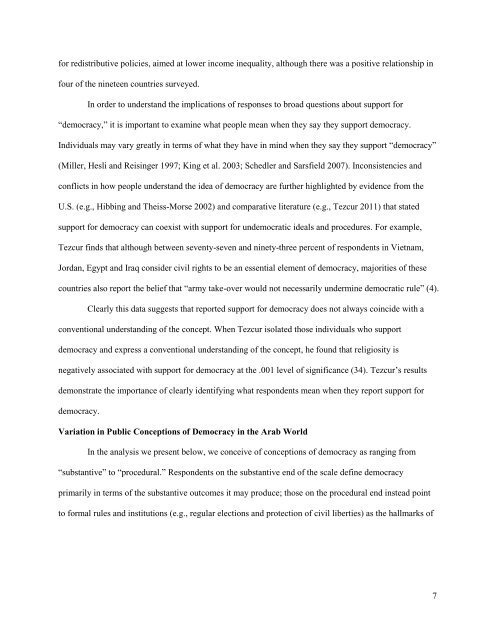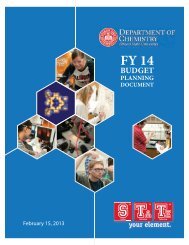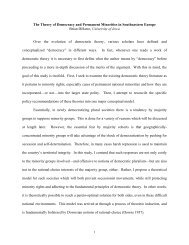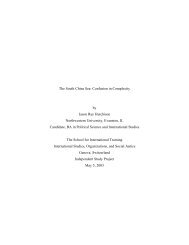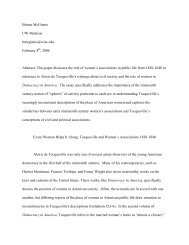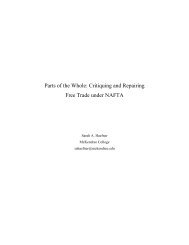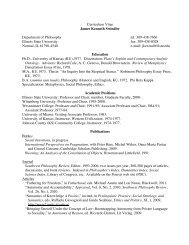1 Procedural and Substantive Conceptions of Democracy in Four ...
1 Procedural and Substantive Conceptions of Democracy in Four ...
1 Procedural and Substantive Conceptions of Democracy in Four ...
Create successful ePaper yourself
Turn your PDF publications into a flip-book with our unique Google optimized e-Paper software.
for redistributive policies, aimed at lower <strong>in</strong>come <strong>in</strong>equality, although there was a positive relationship <strong>in</strong><br />
four <strong>of</strong> the n<strong>in</strong>eteen countries surveyed.<br />
In order to underst<strong>and</strong> the implications <strong>of</strong> responses to broad questions about support for<br />
―democracy,‖ it is important to exam<strong>in</strong>e what people mean when they say they support democracy.<br />
Individuals may vary greatly <strong>in</strong> terms <strong>of</strong> what they have <strong>in</strong> m<strong>in</strong>d when they say they support ―democracy‖<br />
(Miller, Hesli <strong>and</strong> Reis<strong>in</strong>ger 1997; K<strong>in</strong>g et al. 2003; Schedler <strong>and</strong> Sarsfield 2007). Inconsistencies <strong>and</strong><br />
conflicts <strong>in</strong> how people underst<strong>and</strong> the idea <strong>of</strong> democracy are further highlighted by evidence from the<br />
U.S. (e.g., Hibb<strong>in</strong>g <strong>and</strong> Theiss-Morse 2002) <strong>and</strong> comparative literature (e.g., Tezcur 2011) that stated<br />
support for democracy can coexist with support for undemocratic ideals <strong>and</strong> procedures. For example,<br />
Tezcur f<strong>in</strong>ds that although between seventy-seven <strong>and</strong> n<strong>in</strong>ety-three percent <strong>of</strong> respondents <strong>in</strong> Vietnam,<br />
Jordan, Egypt <strong>and</strong> Iraq consider civil rights to be an essential element <strong>of</strong> democracy, majorities <strong>of</strong> these<br />
countries also report the belief that ―army take-over would not necessarily underm<strong>in</strong>e democratic rule‖ (4).<br />
Clearly this data suggests that reported support for democracy does not always co<strong>in</strong>cide with a<br />
conventional underst<strong>and</strong><strong>in</strong>g <strong>of</strong> the concept. When Tezcur isolated those <strong>in</strong>dividuals who support<br />
democracy <strong>and</strong> express a conventional underst<strong>and</strong><strong>in</strong>g <strong>of</strong> the concept, he found that religiosity is<br />
negatively associated with support for democracy at the .001 level <strong>of</strong> significance (34). Tezcur‘s results<br />
demonstrate the importance <strong>of</strong> clearly identify<strong>in</strong>g what respondents mean when they report support for<br />
democracy.<br />
Variation <strong>in</strong> Public <strong>Conceptions</strong> <strong>of</strong> <strong>Democracy</strong> <strong>in</strong> the Arab World<br />
In the analysis we present below, we conceive <strong>of</strong> conceptions <strong>of</strong> democracy as rang<strong>in</strong>g from<br />
―substantive‖ to ―procedural.‖ Respondents on the substantive end <strong>of</strong> the scale def<strong>in</strong>e democracy<br />
primarily <strong>in</strong> terms <strong>of</strong> the substantive outcomes it may produce; those on the procedural end <strong>in</strong>stead po<strong>in</strong>t<br />
to formal rules <strong>and</strong> <strong>in</strong>stitutions (e.g., regular elections <strong>and</strong> protection <strong>of</strong> civil liberties) as the hallmarks <strong>of</strong><br />
7


